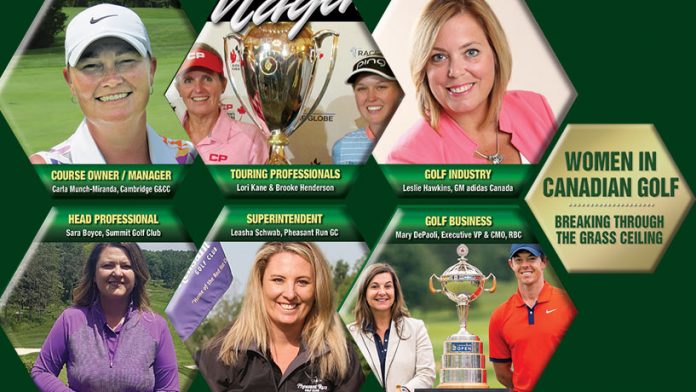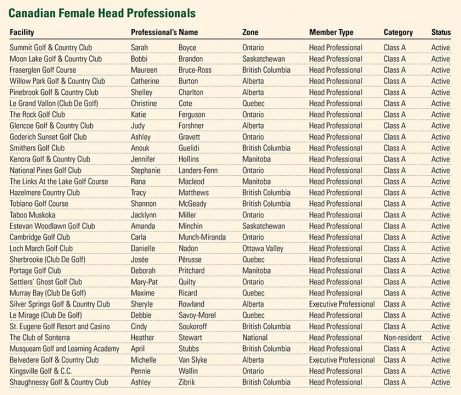
Hazel McCallion ruled Canada’s sixth-largest city with an iron fist for 36 years. She was the ‘Miss’ in Mississauga, and won 12 straight elections by pluralities that would make a dictator blush. Her political and work/life philosophy was as blunt as a punch in the face: “Think like a man, act like a lady, and work like a dog.” She took on the old boys’ network and pounded it into submission.
Her work life extended throughout the Mad Men era infested with Don Draper types. In her later years, she slid comfortably into politics and again put the boots to the old boys’ hegemony.
In an age of #MeToo, gender equality and workplace inclusion, her biography, Hazel McCallion: A Life of Purpose, is must-reading for women in the Canadian golf industry.
Even if the calendar says 2019, the game is still clinging to its old boys’ past, and few women have broken through the game’s so-called “grass ceiling.” Consider this: according to the Canadian PGA, there are 3,500 golf pros in Canada, and out of that, 200 are women, and only 31 are head pros or directors of golf. Meaning: a measly 5 per cent are Class A pros, and .009 per cent hold the top job in the pro shop!

That’s unacceptable since women make up half the population.
This Women’s Golf Day said 36 per cent of junior golfers in America are girls, and 34 per cent of all new golfers are women.
In his 2015 election win, Prime Minister Justin Trudeau was asked why he filled half his cabinet posts with women. “Because it’s 2015!” he scoffed.
That was four years ago and the golf industry is still nowhere near those inclusion numbers!
Liz Dimmock, founder and CEO of Women Ahead, a social impact organization committed to female development, said its now evident businesses with diverse management teams are more profitable.
Yet in the world’s most populace golf market, American women make up less than 9 per cent of general managers, and only 1.5 per cent of superintendents.
“What we are learning is that people from different backgrounds and experiences view the same problem in a different way and come up with different solutions,” Dimmock said in a press release.
Her findings support the R&A’s Women in Golf Charter, launched a year ago in England, with hopes of inspiring an industry-wide commitment to enable women and girls to maximize their potential.
Over 100 organizations committed to the Charter, including Golf Canada. It held its inaugural Women’s Leadership Summit last year at the CP Women’s Open in Regina. The fact that one of our own, Brooke Henderson, won the title and broke a 45-year jinx for homebrews, seemed poetic, and the summit added an exclamation point to the gender equality debate.
Dimmock’s comments are captured in a multimedia editorial and podcast called, ‘Changing the face of the Golf Business.’ It said women account for 24 per cent of golfers worldwide, yet increased representation and new thinking at senior management levels could increase participation and help unlock what is estimated to be a $35 billion opportunity. That’s 35 with a B.
One way to close the gender equality gap is to focus on the game’s outliers, the Hazel-types who have used their talent to imagine a different future for the game. First off, the tee is Leasha Schwab, head superintendent at the Pheasant Run Golf Club in Uxbridge, Ontario.
At age 30, she was featured in Dimmock’s presentation. Schwab organized the first women’s networking event in San Antonio, during last February’s Golf Industry Show in Texas. The career-development symposium started with a shout-out on Twitter and ended with 80 women packing a ballroom at the Marriott Riverwalk.
Said Schwab: “I’m interested in talking to women who feel like they don’t have a voice. For anyone who hasn’t had a chance to connect, it was an opportunity to meet each other and strike up a conversation.”
Her story was captured by TurfNet’s John Reitman, and in it, she talks about watching as colleagues walked off the job when she was promoted from assistant to head superintendent. She knows what it’s like to have a golfer mistake her for a beer cart operator.
The biggest takeaway from Schwab’s story? Even when she attends many of these industry conferences, she’s often asked: “Whose wife are you?”
Is golf still resistant to women holding jobs once occupied by men? Dimmock thinks change is inevitable, and it will be profitable. Embedded in her press release is a 2018 report called, ‘Delivering through Diversity,’ stating that companies in the top 25th percentile for gender diversity were 21 per cent more likely to experience above-average profits.
So why are men – who still hold most of the decision-making positions in the golf industry – so reluctant to embrace equality and hire more women?
It’s arguable that at the very top rung of golf in Canada, the two most powerful influencers are women: Brooke Henderson and Mary DePaoli, RBC’s chief marketing officer.
RBC is the mega-bank and title sponsor of not one, but two stops on the PGA Tour, including the RBC Canadian Open, held this past June at the Hamilton Golf & Country Club. Because of RBC’s deep pockets and DePaoli’s behind-the-scenes arm-twisting, the Canadian stop has a new springtime date, and renewed status as one of the premier stops on Tour.
Henderson’s influence in the women’s game goes far beyond her successes on the Tour, which are considerable, even historic. Her ninth tournament win earlier this year, pulls her past Sandra Post, George Knudson and Mike Weir as Canada’s winningest player – and she’s still just 21.
She will be the star attraction – and the defending champion – at the CP Women’s Open at the Magna Golf Club in Aurora, Ontario in August. But her legacy might be her impact on the game outside the ropes.
It seems patronizing to single out accomplishments by women in the golf industry as proof that gender-equality really matters because in other industry sectors, this battle was won long ago.
But golf has always played by a restrictive set of rules. It wasn’t so long ago that mighty Muirfield, home to 16 Opens, sported a sign outside the clubhouse saying: No Dogs or Women Allowed! It kept out women for 273 years until it ran headlong into the 21st century. The club was dumped from hosting The Open until it recently changed its evil ways.
Unplayable Lie: The Untold Story of Women and Discrimination in American Golf, was written by Marcia Chambers in 1995, and she used the phrase “grass ceiling.”
But exclusion has a long history in Canada. The National, perennially ranked as our No. 1 course, has a dogmatic policy towards women, which came under even more scrutiny when Augusta National abandoned its men’s-only policy in 2012.
The Ladies’ Golf Club of Toronto is North America’s only private golf club established by women for women. But Ada Mackenzie, the legendary player and founder, did so because of the restrictions imposed on woman golfers in the 1930s. She even began a line of women’s sportswear because what they wore at the time was inappropriate and uncomfortable. She entered the Canadian Golf Hall of Fame in 1971.
“While Brooke Henderson… and other female golf professionals are raising the profile of women in golf, it will take another generation to see the impact.” Those cautionary words come from Lesley Hawkins, general manager of adidas Golf Canada, one of the most successful business executives in the game. She is a firm believer that if they see it, they can achieve it, and points to a series of YouTube videos produced by adidas called ‘She Breaks Barriers’ as examples. Those barriers are in the pro shops and the C-suites.
Hawkins’ route to industry executive began because of her close relationship to her father, an avid golfer. She began playing at 15, got a summer job working in a pro shop in Montreal, and once she’d graduated from university, worked at Cobra Golf, Acushnet, and now adidas.
Her ascendency brought her into close contact with the country’s outstanding women pros. She said the younger ones owe a debt to icons like Anne Chouinard (currently head pro at Brudenell and Dundarave Golf courses in PEI), Judy Forshner (head pro at Glencoe G&CC for the past 30 years), and Debbie Savoy Morel (golf director at Golf Le Mirage, in Terrebonne, QC, near Montreal).
Hawkins was a panelist at the inaugural CP Women’s Leadership Summit at the Hotel Saskatchewan last summer, which also included Hall of Famer Lorie Kane. She was also at Magna Club this summer’s media day, along with Henderson, to sing the praises of the women’s game and promote the event, which is moving back to the Greater Toronto Area for the first time since 2001. Henderson is expected to draw huge crowds.
Kane said this year’s summit will be as popular as last year’s in Regina. It was billed as “a celebration of women as business leaders, influencers and community champions.” The goal was to facilitate social and business relationships by providing opportunities to interact with like-minded professional women.
“It’s about encouraging women — businesswomen, athletes or people from whatever walk of life we come from — to gather just to elevate one another and to know that it’s okay to be a female and a competitive one,” said Kane at the time.
At Magna, Kane also talked about her entry into the game, and how as the daughter of fabled pro Jack Kane, she began working at Brudenell at a young age, first in the back shop, then the pro shop, and even learned the nuances of pouring beers at the bar.
The changes in golf have been glacial, and the industry needs an attitudinal shift, said Harry Brotchie, past president of the PGA of Canada, and head of Lakeland Golf Management which oversees nine clubs in Manitoba and Saskatchewan.
Brotchie found recent comments at a NGCOA (National Golf Course Owners Association) meeting disheartening. It discussed the low number of current and enrolling female pros. He said Henderson’s success is like a flashlight leading the industry out of a dark forest.
“Brooke will inspire young girls to get involved in the sport,” he predicts. He also thinks “women are gaining ground in senior management positions outside of golf” and, hopefully, golf will follow this business trend.
Sarah Boyce, head pro at The Summit under the leadership of golf director Ian Leggatt, a former Tour player, has been in the game 16 years after graduating from a professional golf management course in Toronto – the route most taken by future pros, but often dominated by male students.
“In the back of my mind, I knew this job (at The Summit) was a win for the women in this industry, and I hope that we will see more women achieve their goals in the golf business,” she said.
She feels a “greater responsibility” to not only get girls into the game, but get them to make it their profession.
“There is so much opportunity for young women in this industry. Many head professionals ask me if I know of any women who are looking to get a foot in the door, but unfortunately the pool is small and most are already at a club or facility. But that also shows you the need for them – the industry is asking for them. I really feel like it’s a great business for women, and I always recommend that they get into it.”
Boyce has two young daughters and her husband Gary is also a pro at Taboo Club north of Toronto. Sarah said she is “most proud of getting to play golf with my girls and showing them that a woman can be at the top and meet all their goals in life.”
Ashley Zibrik is Shaughnessy Golf Club’s new head pro. She has also served four years on the PGA of B.C. board of directors and was recently named the vice-president of administration – the first female executive in the history of the association. She was named Class “A” Professional of the Year in 2016 (Moe Norman Award) and received the Association’s Professional Development Award in 2014 (Tex Noble Award).
It’s her second year as a TaylorMade staffer and she has just accepted a position on the manufacturer’s advisory council.
Carla Munch-Miranda is not just head professional at Cambridge Golf Club in Ontario, but co-owner with her husband Chris, who holds the title of executive professional.
Kevin Thistle, the new CEO of the Canadian PGA, said the association is working double-time to bring more women into the game. Its Tee Talk Live featured Sandy Cross, chief people office of the PGA of America (senior director of diversity and inclusion) and Allison Sandmeyer-Graves from the Canadian Association for the Advancement of Women and Sport and Physical Activity. In alliance with PGAs around the world, it has joined forces to grow and promote participation by attracting more female pros. It’s close to finalizing its diversity and inclusion policy and a course of the same name for a fall launch at the new PGA of Canada Training Academy.
Hazel McCallion retired from politics in 2014, but even today, at age 98, she sports a work schedule that would exhaust a Navy Seal. During her career, she rubbed the old boys’ network the wrong way. She insists she isn’t a forerunner to #MeToo, but the “How To” movement. She showed women how to reach the top rungs in their chosen profession.
The stakeholders of the game in Canada (still mostly men) must now realize how important it is for women to climb that ladder.











